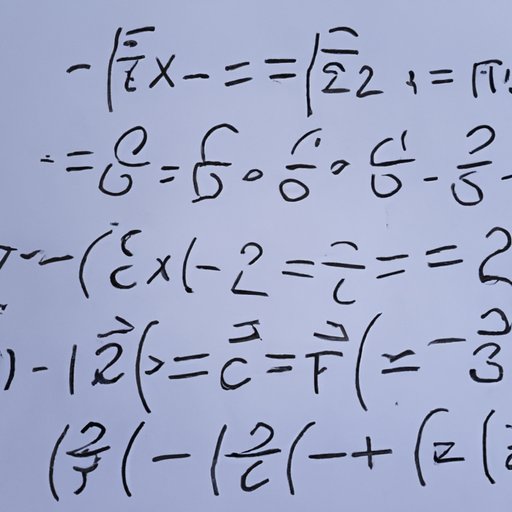
I. Introduction
Math can be a challenging subject for many people. Whether you’re a student struggling to understand complex equations or an adult looking to improve your numeracy skills, math can be intimidating. However, developing your math skills is essential in today’s world, where numeracy is necessary in fields ranging from finance to technology. In this article, we’ll explore five simple tips to help you improve your math skills. We’ll cover the benefits of regular practice, understanding fundamentals, seeking help, using real-life examples, and not being afraid to make mistakes.
II. 5 Simple Tips to Improve Your Math Skills
Improving your math skills does not have to be complicated. If you’re struggling to develop your numeracy, start by practicing regularly. Dedicate some time each day to solving math problems or learning new concepts. Understanding the fundamentals of math is also crucial. Make sure you understand the building blocks of math, such as addition, subtraction, multiplication, and division. If something is unclear, do not hesitate to seek help. That can include asking your teacher, working with a tutor, or using online resources. Using real-life examples can also contextualize your learning and make math feel more relevant. Finally, do not be afraid to make mistakes. Learning from mistakes is an essential part of the learning process.
III. The Benefits of Using Apps and Online Resources to Improve Your Math Skills
Modern technology offers many resources to help you improve your math skills. Various applications and websites are available that can make math practice fun and interactive. You can practice at your speed, receive tailored feedback, and monitor your progress. Some popular apps and websites for math learning include Khan Academy, Mathway, and Photomath. These resources offer lessons and tutorials for a wide range of math concepts, from basic math to calculus.
IV. The Power of Group Study: How Peer Collaboration Can Help Improve Your Math Skills
Studying with peers can be a beneficial way to improve your math skills. Collaborating with others can lead to innovative problem-solving and motivate you to keep going. When you work in groups, you can also learn from others’ perspectives and approaches. Consider forming a study group with classmates or finding online forums for math learners. Make the most of group study by keeping each other accountable, sharing resources, and discussing difficult concepts.
V. How to Tackle Anxiety and Build Confidence When it Comes to Math
It’s normal to feel anxious or fearful when it comes to math. This anxiety can hinder your learning and life skills development. It’s essential to address your math anxiety, and there are many ways to do so. Start by identifying what specifically causes you anxiety, and then practice techniques such as positive self-talk, visualization, and breathing exercises to stay calm and focused. Building your confidence and self-esteem is also essential to improving your math skills. Engage in small successes, celebrate your efforts, and take pride in your learning.
VI. The Importance of Exercise and Practice: Strategies for Building Math Muscle Memory
Developing your math skills requires building your muscle memory. Muscle memory is the ability of your muscles to remember a specific movement, making it easier to perform the task in the future. The same is true for math skills. The more you practice, the more automatic your math thinking becomes. There are many ways to exercise and practice math skills. You can play games, do puzzles, or even just practice mental math. Make it fun by incorporating math into your daily routine, and you’ll see results in no time!
VII. Conclusion
Improving your math skills is critical for success in many areas of life. From regular practice, understanding the fundamentals to making use of innovative group study methods, using apps and online resources, and building your math confidence, there are various ways to do so. Developing a math mindset is key. Continuously practice and take small steps to build your math muscle memory and confidence. With time, your math skills will improve, and you’ll feel more comfortable and confident in tackling math-related tasks.
Keep in mind that learning math is a journey, and it’s okay if you don’t understand everything at first. Embrace the process, learn from your mistakes and successes alike, and take pride in your learning. By following the tips in this article and dedicating time to your math skills development, you’ll gain the abilities you need to succeed in a math-influenced world.




